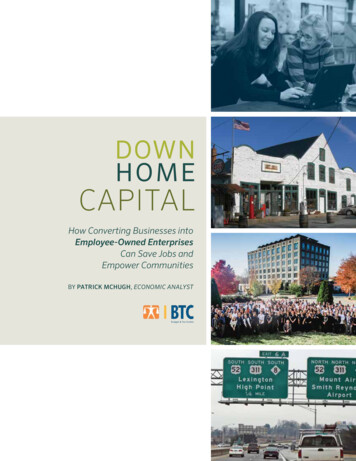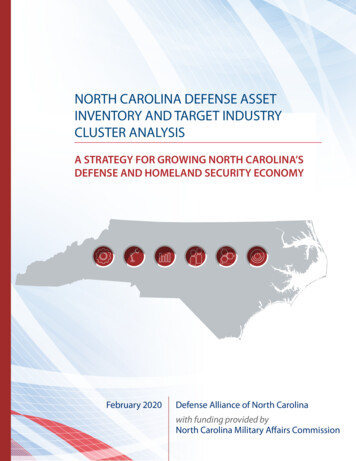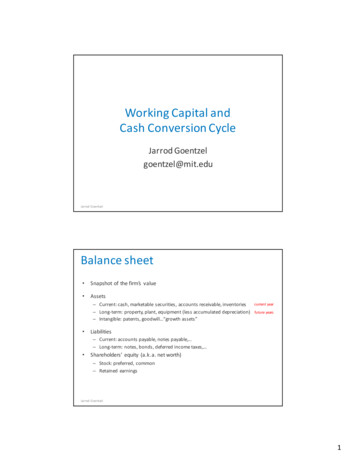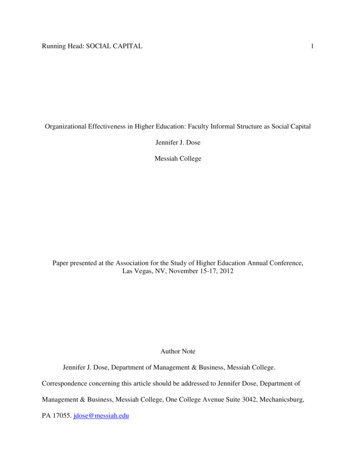
Transcription
DOWNHOMECAPITALHow Converting Businesses intoEmployee-Owned EnterprisesCan Save Jobs andEmpower CommunitiesBY PATRICK MCHUGH, ECONOMIC ANALYST
Converting Businesses into Employee-Owned Enterprises Can Save Jobs and Empower CommunitiesDOWNHOMECAPITALHow Converting Businesses intoEmployee-Owned EnterprisesCan Save Jobs andEmpower CommunitiesBY PATRICK MCHUGH, ECONOMIC ANALYST
DOWN HOME CAPITALINTRODUCTIONNorth Carolina has the potential to turn a grave challenge into a transformativeeconomic opportunity. Thousands of businesses could disappear over the comingyears as baby boomer entrepreneurs enter retirement, threatening to deal a heavy blowto communities across the state. However, by helping many of these firms convert intoemployee-owned companies, we can keep theirdoors open, give workers an ownership stakeinto their economic future, and buttress localeconomies.Employee ownership has an underappreciatedtrack record of success in North Carolina.Employee-owned cooperatives and employeestock ownership plans have proliferated over thelast several decades, and these firms now formpart of the economic backbone of the state.Employee ownership has quietly emerged as oneof the most cost-effective economic developmentHenderson, North Carolina.strategies our state has ever seen. This reportoutlines the scope of the opportunity in front of usand the dire consequences if we let it slip by. Happily, there are ways for state and localgovernments to partner with the private sector and nonprofit organizations to build amore resilient, equitable, and locally-controlled economy in North Carolina.WHY FOCUS ON CONVERSIONS?With thousands of North Carolina entrepreneurs approaching retirement, convertingcompanies that might otherwise disappear into employee-owned enterprises is aparticularly pressing opportunity. This section shows that employee ownership is alreadya proven success in North Carolina, discusses why conversion to employee ownershipcan address one of the major causes of preventable job losses in North Carolina, andshows how it can help our state turn the retirement of the baby boom generation from astark economic challenge into a great opportunity. Conversion to employee ownership candeliver substantial economic benefits to outgoing owners, employees, and communities.Employee Ownership Already a Success in North CarolinaEmployee ownership already has a major footprint in North Carolina, far larger than many casualobservers may recognize. Spread all across North Carolina, employee-owned companies rangein size from corporate behemoths to small firms with only a handful of employees. Employeeownership can be found in a wide range of industries, including manufacturing, distribution,finance, engineering, retail, and construction.2NC Budget and Tax Center
Converting Businesses into Employee-Owned Enterprises Can Save Jobs and Empower CommunitiesMORE THAN 100Number of NCheadquartered firmspartially- or wholly-ownedby their workers throughemployee stock ownershipOVER 750,000Number of current andformer workers benefittedby stock ownership plans*OVER 4.4 BILLIONDollars paid out to workersin 20131*Data on these plans are based on wherethe employers are headquartered, notaccording to where each employee lives, soit is not possible to say precisely how manyNorth Carolina workers currently participatein employee stock ownership structures.However, the these data still give some senseof the magnitude of employee ownershipin North Carolina because, while many ofthe participants in North Carolina basedplans actually work in other states, NorthCarolina workers employed by companiesheadquartered in other states are notreflected in these data.TYPES OF EMPLOYEE-OWNEDENTERPRISESWorker-Owned Cooperatives arebusiness entities (corporations, LLCs,and trusts) with binding bylaws andoperating procedures that determinehow ownership and managementis shared among some or all of theemployees of a company.Employee Stock Ownership Plan(ESOP) is a type of benefit plan thatallows employees to acquire ownershipstakes in their company. ESOPs varywidely in the share of a company’s stockthat is held by employees, process foremployees to acquire stock, the degreeof governance input that employeeowners wield within the firm, howemployee-owners share in the profitsa firm generates, and the conditionsunder which employee-owners can cashin their shares.2(For a more detailed discussion of cooperativesand ESOPs, see Types of Employee-OwnedEnterprises section below)NC Budget and Tax Center3
DOWN HOME CAPITALA Way to Avoid Preventable Job LossesCompany deaths are a major cause of job losses in North Carolina, particularly duringperiods of economic growth. “The failure to plan for business succession in small andmedium-sized companies is the leading preventable cause of job loss in the UnitedStates.”3 Company closures account for more than one-quarter of all jobs that disappearin any given year, and during some comparatively good economic times can account fornearly 40 percent of all job losses.“The failure toplan for businesssuccessionin small andmedium-sizedcompanies isthe leadingpreventable causeof job loss in theUnited States.”Company closures have resulted in over 2.2 million jobs having been lost since 2000, orroughly one-third of all job losses. Of course, not all of these losses could, or even should,be prevented. Companies come and go for a variety of reasons, some perfectly naturalin the healthy evolution of the market. However, many of these companies were viableenterprises that closed simply because new owners with sufficient capital and businessexperience could not be found to take over when the old owners wanted to retire or moveon to new endeavors.Losses due to business closures have seriously hampered North Carolina’s economicrecovery, offsetting a huge share of the new jobs that have been created. In fact, thenumber of jobs lost to business closures since 2010 is larger than the net job gains madein North Carolina during that period. If just 10 percent of the jobs lost to business closuressince 2010 had been saved, there would be at least 65,000 more jobs than exist today,which could have driven the state’s unemployment rate below 4 percent.Contend with the Silver TsunamiAs the baby boom generation enters retirement (often referred to as the Silver Tsunami),a huge number of businesses will need to find new ownership. In 2013, more than half ofall U.S. business owners were older than 50,4 up significantly from pre-recession levels.54NC Budget and Tax Center
Converting Businesses into Employee-Owned Enterprises Can Save Jobs and Empower CommunitiesEstimates vary, but it is likely thatupwards of 4 million companiesowned by baby boomers willbe sold or dissolved by 2030,6leading to the transfer of roughly 10 trillion in business assets.7While the Great Recession forcedmany baby boomers to delaytheir plans to sell and retire, weare on pace to see more smallbusinesses change hands in2016 than any year since thestart of the Great Recession.8Converting these businessesinto employee-owned enterprisesprovides a way to keep the doorsopen and keep ownership rootedin local communities, ultimatelyturning a profound economicchallenge into an opportunity tomake families and communitiesmore economically resilient.With relatively few businessesbeing kept in the family, moreand more retiring businessowners are looking to sell totheir employees.9 However, eventhough roughly half of all smallbusiness owners plan to leavetheir businesses over the next 10years, 72 percent have not takensteps to plan their exit.10North Carolina is more exposedto the challenges of the SilverTsunami than many other states.Official projections expect the number of North Carolinians at or nearing retirement (age60 to 70) to grow by more than 200,000 over the next 15 years, with this age cohortnearing 1.5 million by 2030. Policy and media discussions often focus on the real challengeof replacing experienced workers, but the Silver Tsunami also threatens the survival ofthousands of North Carolina businesses that are owned by people who will be looking toretire in the coming years. Converting these businesses into employee-owned firms canhelp to keep viable enterprises open and locally controlled.This economic challenge is particularly stark for some parts of the state that can least affordto lose viable local companies. As can be seen in Figure 4, the share of the population setNC Budget and Tax Center5
DOWN HOME CAPITALto enter retirement is higher in many of the less urban parts of North Carolina that havestruggled economically over the past two decades.Not only do many of these communities face losing a larger share of their existing businessowners, the losses would be harder to replace than in urban areas that are experiencingmore robust job growth and new business formation. As shown in Figure 5, many of theeconomically distressed rural counties inNorth Carolina also have a larger share oftheir population that is nearing retirement.As such, the retirement of baby boomerscould lead to the closure of businesses incommunities that can least afford to loseviable enterprises.While it is difficult to precisely estimate howmany businesses are run by people at ornearing retirement age, we do know thata huge share of the jobs lost to businessclosure happen in relatively matureenterprises. North Carolina is particularlyreliant on older businesses. While only 3percent of all businesses nationwide havebeen around for more than 15 years, theselegacy companies make up 6 percent ofall North Carolina firms.11 In 2014 alone,more than 100,000 jobs were lost whenestablishments that had been around for atleast 16 years closed their doors.6NC Budget and Tax Center
Converting Businesses into Employee-Owned Enterprises Can Save Jobs and Empower CommunitiesWithout a proactive strategy for transitioning ownership, North Carolina stands to losethousands of viable companies over the coming years, but converting these firms intoemployee-owned enterprises can keep them open and locally-controlled.Bipartisan Way to Address Stagnating WagesSupport for expanding employee ownership can be foundacross the political spectrum. At the same time that progressiveleaders in places like Madison, Wis., and Oakland, Calif., look forways to give workers more agency in their places of work, RepublicanGov. Terry Branstad of Iowa has made expanding employee ownershipa key pillar of his economic development agenda, saying “ESOPS(Employee Stock Ownership Plans) can keep companies—and the jobsthey provide—in local communities. They are a transition plan forbusiness owners and a growth strategy for communities.”12While most economists and political leaders agree that the growingdivide between what American workers earn and the profits that theirlabors create is a problem, there is far less consensus on how toaddress the issue. By giving workers a way to directly benefit whentheir companies grow and prosper, employee ownership representsthat all-too-rare tool to address income inequality that can garnersupport from across the political spectrum.“ESOPS (EmployeeStock Ownership Plans)can keep companies—and the jobs theyprovide—in localcommunities.They are a transitionplan for businessowners and agrowth strategy forcommunities.”BENEFITS TO THE COMMUNITYThe benefits of worker ownership do not stop at a business’s front door. This sectionreviews a variety of reasons that employee-owned firms are often more competitive, lessprone to relocate, and ultimately build more prosperous and resilient local economies. Ontop of these advantages, supporting conversion to employee ownership can be a morecost-effective economic development strategy than attracting new companies.Locally-Owned Economies are More ProsperousLocal ownership is fundamental to building prosperity and economic vitality. All otherthings being equal, communities with more local business ownership tend to achieve fastereconomic growth than areas where comparatively few of the firms are locally-owned.13When firms are locally-owned, the profits are more likely to be spent or reinvested locally,keeping that capital flowing and creating opportunities within a community.Local ownership can also play a vital role in keeping businesses from pulling up stakesand moving away. When a company is primarily owned by outside entities, decisions aboutwhether to move are often determined purely by financial considerations. Businessesowned by outside entities regularly relocate to secure financial incentives from otherjurisdictions, or when a modestly higher rate of return can be achieved by locating thebusiness elsewhere, even if the business is profitable and viable in its current location.NC Budget and Tax Center7
DOWN HOME CAPITALEmployee-owners are more likely than outside capital to consider the toll of uprooting theirfamilies, moving away from friends, finding new places of worship, forcing their children tostart anew in unfamiliar schools, and many other human costs of relocating a business. Assuch, employee ownership can make it less likely that economic pillars of local communitieswill disappear simply because a slightly better short-run deal may be found elsewhere.Employee-Owned Companies Often More CompetitiveEmployee ownership can actually make companies function more effectively. Particularlyfor firms where workers take an active role in managing the enterprise, workers are morelikely to work harder and to find innovative solutions to the challenges that businessesface,16 which in turn tends to make these firms more productive and competitive.17Of course, no business is immune to market forces, but companies that make the mostof their employees’ skill and diligence are more likely to survive the competitive pressuresof the modern marketplace. As such, expanding employee ownership can help make thebusiness foundations of local communities more competitive and durable.Employee-Owned Companies are Often More ResilientWorker-owned companies are often better at getting the best out of their people, keepingtalented workers, and innovating in the face of new challenges, all of which tends to makethem more durable enterprises. Results of different studies vary, but most analysis has foundevidence that employee ownership makes firms more productiveand profitable.18 Broad incentives like profit sharing and ownershipplans often have larger positive impacts on job performance thanIf just 10 percentnarrow incentives like performance bonuses.19 Employee ownership20of the jobs lost totends to make employees work harder and reduces turnover. Allof these virtues help worker-owned companies survive at higherbusiness closuresrates than privately-held companies more broadly.21Build a more Inclusive Local EconomyConverting existing companies into employee-owned enterprisescan help empower historically marginalized communities andfamilies. It is no secret that white men own a disproportionatelylarge share of businesses that exist in many communities, andit is particularly true of the retiring generation of baby boomerentrepreneurs. Analysis of business transactions show that morethan 85 percent of business purchasers over the age of 65 areCaucasian, compared to less than half of young adults buyingbusinesses.22since 2010 had beensaved, there wouldbe at least 65,000more jobs than existtoday, which couldhave driven the state’sunemployment ratebelow 4 percent.Supporting conversion to employee ownership is one way to accelerate this process andgive more people and families the opportunity to take ownership over their economicdestiny. Employee ownership can often allow groups of workers who could not individuallyafford to purchase a business to access needed capital. Conversion to employee ownership8NC Budget and Tax Center
Converting Businesses into Employee-Owned Enterprises Can Save Jobs and Empower CommunitiesTHE MAST GENERAL STORE:An employee-owned community institutionInheritors of a tradition as American as Mom and applepie, the Mast General Stores has been operating as anemployee-owned firm since 1995. The Mast General Storesells goods and services, but it alsofunctions as a meeting space for localsand passers-though. Since John andFaye Cooper rescued and reopened theValle Crucis location in 1980, the storehas grown and the business expandedinto several new locations across theCarolinas and Tennessee.14 Converting toemployee ownership made perfect sensefor business with deep roots in the localcommunity. The company is proud toplace ownership in the hands of “thosewho are helping to keep the traditions ofthe old general store alive everyday theemployees.”15also deepens pools of business experience, knowledge, and networks in communitiesthat often struggle to access all three of these vital ingredients to successful businessownership. Ultimately, helping one company to become worker-owned can make it easier forthe friends, family, and neighbors of those new proprietors to start successful businessesof their own.Enable Serial EntrepreneursWhile converting businesses into worker-owned enterprises can be particularly importantwhen current owners are looking to retire, this need not be the only impetus to exploreconversion. Conversion to worker ownership can allow entrepreneurs to try their hand atstarting even more viable businesses. Entrepreneurs with a knack for identifying marketopportunities can be a huge community asset, but they need mechanisms to cash out ofexisting enterprises and to free up their time to launch new businesses.Retaining Jobs Often Cheaper than Attracting ThemFocusing on protecting and preserving existing jobs often yields a greater return on localcommunities’ investments. Economic development effort and media attention is regularlylavished on attracting new companies and facilities, but it is often more cost-effective toNC Budget and Tax Center9
DOWN HOME CAPITALsave what already exists thanto bring in something new.Particularly when it comesto viable and locally-ownedenterprises with deep roots,efforts to save those firms canoften yield more substantiallong-term community benefits.When companies bring newjobs to an area, there’s noguarantee that all of thosejobs will actually go to existingresidents. Economic analysishas shown that the majorityof new jobs created in mostcommunities are taken by newarrivals or people commutinginfromneighboringjurisdictions.23 People movinginto a community often bringeconomic benefits, but theyalso create costs for localgovernments,particularlyif they have children thanwill attend local schools.Commuters can bring neededconsumer dollars, but they also strain infrastructure systems without paying propertytaxes in the community where they work. As a result, financial incentives to attract newcompanies often have modest, or even negative, fiscal return for local governments.Compared to traditional economic development incentive programs, expanding workerownership is an incredible bargain. As shown in Figure 7, the Ohio Employee OwnershipCenter has amassed a track record of creating and saving jobs through employee ownershipat a fraction of the cost associated with North Carolina’s flagship economic developmentincentive programs.North Carolina’s three largest discretionary grant programs—the North Carolina JobDevelopment Investment Grant (JDIG), One North Carolina Fund, and Job Maintenanceand Capital Development Fund (JMAC)—all require several thousand dollars in state andlocal funds per job created or retained. The Ohio Employee Ownership Center providestechnical assistance to companies as they become employee owned at a fraction of thecost of the traditional incentive programs that exist here in North Carolina.10NC Budget and Tax Center
Converting Businesses into Employee-Owned Enterprises Can Save Jobs and Empower CommunitiesBENEFITS TO FUTURE WORKER-OWNERSWorker ownership can provide a partial antidote to one of the fundamental economicpathologies of our time: the widening gulf between wages and the value of what Americanworkers produce. For the past 30-plus years, workers in the U.S. have kept increasing theirproductivity, but their actual income has not grown accordingly.Economists and policymakers may disagree about why wages are not growing along withthe value of what is being created, but the fact itself is indisputable. Expanding ownershipand reducing dependence on wages alone is one way to address this building crisis.Cooperatives and Employee Stock Ownership plans provide mechanisms to give morepeople an ownership stake in their economic future, as well as a way to close the gapbetween the value of what working North Carolinians create and what they take home tosupport themselves and their families.24Higher IncomeEmployee ownership can help workers and their families build financial assets and gainincreased economic security.25 Expanding ownership share (often through ESOPs) doesnot merely substitute stock for other forms of pay, but actually increases what employeestake home at the end of the day. Given the increasing disconnect between base wages andproductivity, there is good reason to believe that expanding employee ownership wouldwork to meaningfully reduce income inequality.26Weather Economic Downturns with Fewer LayoffsWorker ownership also tends to change how companies deal with economic downturns.Worker-owned companies are less likely to lay people off in response to an economicshock. It makes perfect sense that companies where workers are partial owners and havea say in how the enterprise is managed would find ways to weather economic storms thatdo not result in firing people.26 Instead, these companies tend to find more fluid solutionslike reducing hours or temporarily reducing pay27 to avoid massive layoffs.These differences in operational philosophy can have benefits beyond just keeping peopleemployed. Companies that retain experienced workers are often able to return to fullcapacity when the winds of recession stop blowing. In fact, some European countrieshave developed programs to encourage precisely this kind of behavior, recognizing thatthe entire economy benefits when otherwise healthy companies can ride out economicdownturns in one piece and be ready to ramp back up when demand recovers.29Make Work More RewardingEconomic development strategies often boil down to simply creating jobs, with relativelylittle thought to the non-financial benefits that can arise from the right kind of workenvironment. Most of us intuitively recognize the distinction between simply having a joband taking pride in one’s work. Simply put, employee ownership can make all the differencebetween drudgery and dignity. When people can shape how their work gets done and feelNC Budget and Tax Center11
DOWN HOME CAPITALa sense of ownership in what is ultimately produced, a job can become more than just away to earn a paycheck. In fact, employees in ESOP companies report being only a quarteras likely as their peers in non-employee-owned companies to start looking for a new job inthe next year.30 Employee ownership has also been shown to increase involvement in firmdecisions, job satisfaction, quality of supervision, and support for training, all key indicatorsthat a workplace is rewarding beyond mere dollars and cents.31These benefits of converting to employee ownership can be vital regardless of how a companyoperates before the change. Transition to worker ownership can create the opportunity forexpanding agency in the workplace and investment in how the business performs. Even forcompanies that already empower their employees to take ownership over how their work getsdone, conversion to employee ownership can ensure this remains the case.BENEFITS TO CURRENT OWNERSConversion to employee ownership carries a variety of advantages to the outgoing owner.This section discusses federal tax advantages for converting to employee ownership, whyconversion deals can be more convenient for all concerned, and how conversion cansafeguard values and human relationships that business owners have helped to build.Tax AdvantagesFor owners selling C-Corporations, there are substantial potential tax advantages in sellingto their employees. The Internal Revenue Service’s Section 1042 Rollover allows businessowners to defer capital gains taxes on earnings resulting from the sale of the company toits employees.32Under the provision, when owners sell 30 percent or more of the stockto workers and reinvest profits into domestically owned establishments, securities or anEmployee Directed Trust, they can defer capital gain taxation on the value of the sharessold to employees.33The 1042 rollover is not a tax exemption. Capital gains tax will be owed if the propertyinto which the proceeds are invested are subsequently sold. However, the selling ownerat the very least gets the use of capital that would have otherwise been taxed to reinvest.Moreover, if the outgoing owner passes away while still holding the property into which theyinvested the proceeds of selling their business, their heirs will not owe capital gains on theoriginal business sale.34Streamline the Sale ProcessSelling to employees can also make the entire process simpler and faster.37 As opposedto selling to an outside party that needs to be brought up to speed on all aspects of howthe business functions, engaged employees are often already know why the enterpriseis viable and valuable. Similarly, clients and suppliers often already know and trust theemployees who are stepping up to purchase the business, easing the process of transitionfor all involved. Beyond simple convenience, this continuity can make it more likely that thebusiness survives the transition.12NC Budget and Tax Center
Converting Businesses into Employee-Owned Enterprises Can Save Jobs and Empower CommunitiesAllow Owners to be Mentors during Gradual RetirementConversions are often structured in a way that allows an outgoing owner to remain involvedin the company for some time after the official sale is consummated. In many cases this is amutually beneficial arrangement as the new worker-owners often need substantial training,introductions to vital clients and suppliers, and other knowledge that may have been ridingaround in the mind of the outgoing owner. Many owners appreciate the opportunity tomentor their staff into businessowners, and to take an active handin safeguarding the future of theRecent Conversioncompany they have invested years ofSaves Rural Retailer 1 Million:their lives into building.38 As DennisQuaintance mused after making aTHE ISLAND COOPERATIVEseries of restaurants and hotels thathe helped to found in GreensboroA business owner in rural Maine successfullyinto a 100 percent employee-ownedcaptivated an extra million dollars in profitenterprise, “I feel like I have a newon account of the 1042 Rollover by exiting histoy This is going to be really fun.”39companies and converting to a cooperative.35The owner’s two grocery stores, hardware, andProtect Staff and Familiespharmacy consolidated to becomethe Island Employee Cooperative,Selling to an outside party meansallowing for more than 60 workersputting the fate of employees into thehands of strangers. Entrepreneursto maintain employment whileoften agonize over the futurethe community’s local servicesprospects of their employees andremained open. The Sectionhate to see subsequent owners lay1042 Rollover enabledoff long-time employees. Particularlysatisfactory negotiationswhere the outgoing owner hasand sales terms, thusformed strong relationships with theirpromoting cooperativeemployees and their families, sellingconversion as athe business directly to them is avaluable successionway to ensure that outside decisionoption for not onlymakers do not upend the communitythe exiting owner,surrounding their business. Whenbut also the workersNew Belgium Brewing Companyand community as abecame 100 percent worker owned,CEO and co-founder Kim Jordanwhole.36was ecstatic about perpetuatingthe legacy of what she had helpedto build. “There are few times in lifewhen you get to make choices thathave multi-generational impact—this is one of those times. We have an opportunity towrite the next chapter in this incredible story and we’re really excited about that.”40NC Budget and Tax Center13
DOWN HOME CAPITALTYPES OF EMPLOYEE-OWNED ENTERPRISESWorker-Owned CooperativesWorker-owned cooperatives are business entities (corporations, LLC’s, and trusts) withbinding bylaws and operating procedures that determine how ownership and managementis shared among some or all of the employees of a company. These bylaws address a rangeof operating parameters including: Process for joining and leaving the cooperative: Not every employee at acooperative must be a worker-owner. Most worker-owned cooperatives have atrial period of employment before someone can become a worker-owner, andthat trial period can be quite extensive. Bylaws can also govern how currentworker-owners can sell their stake if they decide to leave the company, generallypreventing the sale of an ownership share to an outside entity. Process for sharing profits: Bylaws also specify mechanisms for sharingout profits among the worker-owners. The specific structure depends on thecooperative (e.g. everyone shares equally, seniority is rewarded, share in profitsbased on hours worked or value created, etc.).OPPORTUNITY THREADSPeek in the door of an unassuming industrial building near Morganton,and you can glimpse a better economic future taking shape here and now.Founded in 2009 with one sewingmachine, Opportunity Threads (OT)has grown into a worker-ownedcooperative cut and sew companyemploying more than 20 people ina 10,000 sf2 manufacturing space.Most of the worker-owners arepart of the sizable community ofCentral American immigrants aroundMorganton, having worked for othermanufacturing companies in thearea
their population that is nearing retirement. As such, the retirement of baby boomers could lead to the closure of businesses in communities that can least afford to lose viable enterprises. While it is difficult to precisely estimate how many businesses are run by people at or nearing











